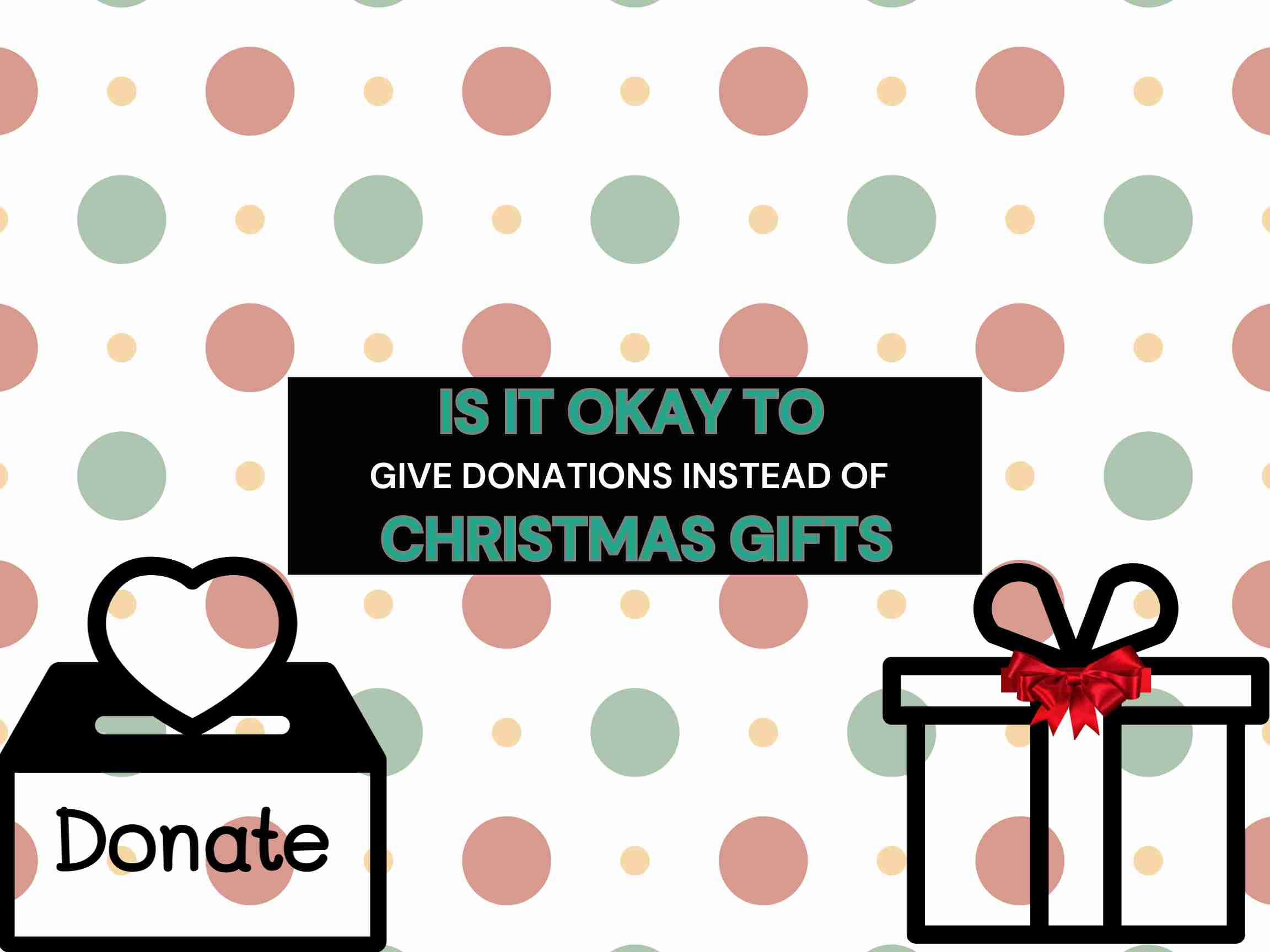Donations Instead of Christmas gifts: When & How is It Okay?
This post may contain affiliate links. If you purchase through one of these links, I may receive a small commission at no extra cost to you. As an Amazon Associate, I earn from qualifying purchases.

Are you struggling to find meaningful Christmas gifts? Are you tired of getting gifts you don’t need for Christmas? Do the world’s pressing problems make you feel miserable about exchanging material presents? Choosing donations instead of Christmas gifts is an emerging trend that addresses these challenges, but it also brings its own set of ethical questions.
While donations offer a way to make a positive social impact, they can also be seen as intrusive, insensitive, impersonal, or lacking the sentimental touch of traditional gifts.
This guide explores the ethical and practical aspects of choosing donations over gifts. You’ll learn when it’s appropriate to opt for this alternative, how to make a donation in someone’s name, and how to approach the subject with loved ones. Read on to navigate this complex yet rewarding terrain.
Is it Right to Donate Instead of Giving Gifts?
When it comes to giving donations instead of gifts, one big question comes up: is it even a real gift? This question opens the door to some interesting debates about what gift-giving should look like.
Why Would Someone Donate Instead of Giving a Gift?
Some people prefer giving donations because it feels more meaningful. Choosing to donate also goes against the common holiday focus on buying and getting more things, offering a way to give that’s more about helping others.
Instead of buying another gadget or trinket, they’re helping a cause that needs support.
Plus, when you donate in someone else’s name, you’re sharing the experience of helping others. It’s a way to include your loved one in making a positive impact.
Donating in someone else’s name, rather than your own, can also make the gesture more about the recipient and less about your own philanthropy, adding a personal touch to a charitable act.

Why Would Someone Dislike Donating Instead of Giving or Getting a Gift?
But not everyone likes the idea.
Some might feel that a donation doesn’t give them anything they can keep and enjoy.
They may also worry that you’re choosing an easy way out of the sometimes tough process of gift selection.
When the donation is made to a cause they’re not passionate about, it could even feel like you’re pushing your own interests on them.
Also, making a donation in someone else’s name without asking them first could come across as overstepping boundaries. The donation could feel less like a gift and more like a decision made for them, without their input.
So is donating Instead of Giving a Christmas Gift right or wrong?
Choosing to donate instead of gifting at Christmas is right only if the recipient would appreciate such a gesture. In all other cases, it is wrong and would be a way of overstepping someone’s boundaries and disregarding their personal preferences.
Related:
How to organize a candy gram Christmas fundraiser
The ultimate guide on holiday wrapping paper fundraiser
How to Donate Instead of Giving a Gift – Step-by-step Guide to Making a Charitable Donation in Someone’s Name

As discussed earlier, the first essential step is ensuring that the gift’s recipient is genuinely open to this form of giving. It’s vital to have a candid discussion and receive their wholehearted agreement before moving forward with the steps outlined below. Proceeding without their consent could make your well-intended gesture feel more like an imposition than a gift.
Choose a Cause that Aligns with the Recipient’s Values
Identifying a cause that the gift recipient is passionate about will make your donation infinitely more personal and meaningful.
Reflect on past conversations you’ve had with them or posts they’ve made on social media to discern their interests and values. Do they have a penchant for animal welfare, environmental issues, or maybe healthcare?
When donating in someone else’s name, the cause you select speaks volumes about your relationship with them. It can turn an already thoughtful gift into a deeply personal one. A well-chosen cause resonates with the recipient’s core values, turning the donation into a gift that truly honors them.
Research Credible Charities
The importance of selecting a credible charity cannot be overstated.
- Utilize platforms like Charity Navigator, which offer comprehensive reviews on an organization’s financial health, accountability, and social impact.
- Check how much of your donation actually goes to the cause versus administrative costs.
- Dig deeper by looking at the charity’s annual reports and financial audits. The objective is to confirm that the charity operates transparently and allocates funds effectively.
- In addition to statistical reviews, scour recent news articles and social media posts related to the charity. This step can offer a more dynamic view of the organization’s current status, its reputation, and any potential controversies. A charity without red flags in the news or on social platforms is likely a safer choice.
How to Donate: Online, Checks, Etc.
Actually making the donation is a logistical step, but it carries its own set of considerations.
If you opt for an online donation make sure the charity’s website is secure.
Most reputable organizations offer multiple payment options, such as credit cards, debit cards, and e-wallets like PayPal. Some even accept cryptocurrencies. Always double-check that the website uses secure data encryption methods to protect your financial details.
For those who prefer more traditional payment methods, many charities still accept checks. Make sure to send it through secure and traceable mail. Also, keep all confirmation emails, payment receipts, or canceled checks. Not only will these serve as evidence for tax deductions, but they are also proof of your donation – which essentially is your Christmas gift.
Providing a Gift Certificate or Card to Inform the Recipient
Once the donation has been made, you’ll want to inform the recipient.
Many organizations offer customizable gift certificates or cards that can be sent directly to the recipient, either physically or digitally. These often include space for a personal message, enabling you to share why you chose that particular cause or charity.
Creating your own notification is another way to make your gift unique. Craft a heartfelt letter, or even produce a brief video message to add an extra layer of sentiment. It provides something tangible the recipient can keep, serving as a lasting reminder of both the gift and the thought that went into it.
How to Request Donations Instead of Christmas Gifts

Now what if you are in the recipient’s shoes and want to request a donation instead of a gift? The situation is still equally tricky as the person interested in giving you a regular gift may not appreciate your idea of asking him to make a donation. So how should you handle this situation and how to request for a donation instead of a gift. Read this guide to find out.
The Right Approach for Christmas Requests and Preparing for Mixed Reactions
Start by having a plan. Know the charity you support and be ready to share some details. People like to know where their money is going. Briefly explain why this cause matters so much to you. It will make your request more personal and compelling.
Now, the etiquette. It’s vital to be polite and clear. Choose an appropriate setting where you can have an open dialogue. A one-on-one conversation works best for this.
When it comes to accepting rejection, brace yourself for all kinds of responses. Not everyone will be on board with this idea, and that’s okay. Don’t pressurize or guilt-trip anyone into donating. If they say no, thank them for their time and let it be.
Sample Conversations for Asking for Christmas Donations
You need to be clear but sensitive in your phrasing. Here are some template sentences tailored for Christmas:
- “This Christmas, would you consider donating to [Charity Name] instead of buying me a gift? They’re doing remarkable work for [specific cause].”
- “I’m really passionate about [Charity Name] this holiday season. If you’re considering getting me a Christmas gift, I’d be thrilled if you’d donate to them instead.”
- “Honestly, I have everything I need. So, this Christmas, I’m inviting friends and family to support [Charity Name] instead of buying gifts for me. What do you think?”
These sentences are unambiguous yet polite, clarifying your request without imposing it on anyone.
Timing Your Christmas Donation Request
When it comes to Christmas, timing is everything. It’s advisable to bring up your donation request about a month before Christmas Day. This time frame allows people to digest the idea, make a decision, and act upon it if they wish.
Don’t forget a polite reminder a week or two before the holiday. It’s a courtesy that could help them check off an item on their holiday to-do list while supporting a cause you care deeply about.
Frequently Asked Questions
Is it rude to ask for donations instead of Christmas gifts?
No, it’s not inherently rude to ask for donations as long as you approach the topic respectfully and give people the freedom to choose. The key is to make your request clear but non-imposing, letting people know why the cause is meaningful to you. Be prepared for different responses and always respect the choices of your family and friends.
How can I ensure the donation is actually used for the intended purpose?
To ensure that your donation is put to good use, do thorough research on the charity beforehand. Utilize resources like Charity Navigator and scrutinize the organization’s annual reports and financial audits. It’s crucial to select a reputable charity that allocates funds effectively and operates transparently.
Can I get a tax deduction for making a donation as a Christmas gift?
In many jurisdictions, charitable donations are tax-deductible. However, the tax benefit usually goes to the person who makes the donation. If you’re donating in someone else’s name as a Christmas gift, you may be the one eligible for the tax deduction, not the gift recipient. Check the legalities before making the donation if you want the recipient to be the recipient of the tax deduction.
Always keep proof of the donation, like confirmation emails or payment receipts, for tax purposes.






